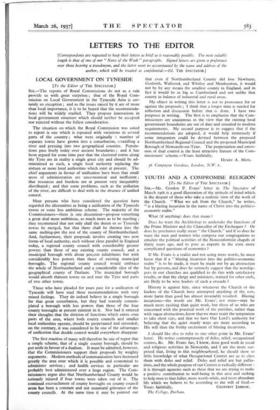LOCAL GOVERNMENT ON TYNESIDE
LETTERS TO THE EDITOR
[Correspondents are requested to keep their letters as brief as is reasonably possible. The most suitable length is that of one of our " News of the Week" paragraphs. Signed letters are given a preference over these bearing a pseudonym, and the latter must be accompanied by the name and address of the author, which will be treated as confidential.—Ed. THE SPECTATOR.]
To the Editor of THE SPECTATOR.] SIR, _The reports of Royal Commissions do not as a rule provide us with great surprises ; that of the Royal Com- mission on Local Government in the Tyneside Area is cer- tainly an exception ; and as the issues raised by it are of more than local importance, it is to be hoped that the recommenda- tions will be widely studied. They. -propose innovations in local government structure which should neither be accepted nor rejected without the fullest consideration.
The situation on which the Royal Commission was asked to report is one which is repeated with variations in several parts of the country ; what were originally n number of separate towns have grown into a conurbation, straddling a river and pressing into two geographical counties. Popula- tions pass freely today over ancient boundaries ; and it has been argued for some time past that the clustered towns along the Tyne are in reality a single great city and should be ad- ministered as such, a single local authority replacing the sixteen or more local authorities which exist at present. The chief arguments in favour of unification have been that small areas of administration are uneconomical and inefficient ; that resources and burdens are at present very inequitably distributed ; and that some problems, such as the pollution of the river, are difficult to deal with in the absence of unified control.
Most persons who have considered the question have regarded the alternatives as being a unification of the Tyneside towns or some less ambitious scheme. The majority of the Commissioners—there is one dissentient—propose something a great deal more ambitious, so much more as to be startling ; they recommend that not only shall the dozen or so Tyneside towns be merged, but that there shall be thrown into the same melting-pbt the rest of the county of Northumberland. And, furthermore, their proposals involve creating two new forms of local authority, each without close parallel in England today, a regional county council with considerably greater powers than those of any existing county council, and a municipal borough with about 9oo,000 inhabitants but with considerably less powers than those of existing municipal boroughs. The regional county council would embrace • the whole of Northumberland and a considerable slice of the geographical county of Durham. The municipal borough would absorb thirteen towns on and near the Tyne and parts of two other towns.
Those who have pleaded for years past for a unification of Tyneside will have read these recommendations with very mixed feelings. They do indeed believe in a single borough for that great conurbation, but they had scarcely contem- plated a borough with less powers than those of the four county boroughs at present existent in it. Nor had it entered their thoughts that the division of functions which exists over parts of the area, where both county councils and smaller local authorities operate, should be perpetuated and extended; on the contrary, it was considered to be one of the advantages of unification that double control would everywhere disappear.
The first reaction of many will therefore be one of regret that a simple scheme, that of a single county borough, should be put aside in favour of a dualism. It must be admitted, however, that the Commissioners support their proposals by weighty arguments. Modern methods of communication have increased greatly the area over which it is possible and economical to administer services ; and health services in particular are probably best administered over a large region. The Com- missioners argue also that Northumberland County would be seriously injured if four towns were taken out of it. The continual encroachment of county boroughs on county council areas has been a constant and not unnatural grievance of the county councils. At the same time it may be pointed out
that even if Northumberland County did lose Newburn; Gosforth, Wallsends and Whitley and Monkseaton, it would not be by any means the smallest county in England, and in fact it would be as big as Cumberland and not unlike that county in balance of industrial and rural areas.
My object in writing this letter is not to pronounce for or against the proposals ; I think that a longer time is needed for reflection and discussion before that is done. I have two purposes in writing. The first is to emphasise that the Com- missioners are unanimous in the view that the existing local government boundaries are out of date and unsuited to modern requirements. My second purpose is to suggest that if the recommendations are adopted, it would help immensely if some integration could be devised between the proposed Northumberland Regional Council and the proposed Municipal Borough of Newcastle-on-Tyne. The perpetuation and exten- sion of dual control is the least attractive feature of the Com- missioners' scheme.—Yours faithfully,










































 Previous page
Previous page